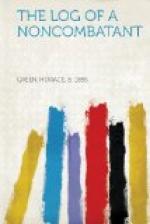“This people is terribly in earnest,—deluded, of course, with devotion to a false idea, but it is the delusion that spells accomplishment. The country is earnestly and honestly possessed with an Idea, and the idea is that Might is Right. That is the awful pity of it. When will the awakening come?
“Later: To-day I had an interview of three quarters of an hour with Herr Dr. R. W. Drechsler, head of the American Institute, attached to the University of Berlin. To-morrow I hope to see Excellency von Harnach, president of the University of Berlin, to whom I have a letter. Dr. Drechsler was kind, agreeable, extremely interesting. He showed me some New York newspapers—the first real news of the war I have had for weeks. The ‘Tribune’ and ‘Times’ had an account of us fellows down in the cellar at Antwerp. Drechsler and I had an interesting argument, and before I left he deluged me with pamphlets and literature for the improvement of my mind and sympathies. Even so he was unlike the average German. As a rule they have attempted to cram their arguments down my throat. These Teutons think they can force you to believe.
“Dr. Drechsler and the proprietor of the Kaiserhof, and, of course, the Foreign Office warned me that it was forbidden to go to the prisoners’ camps, either at Zossen or Doeberitz. Some correspondents had been taken on ‘personally conducted’ tours; but because of misinformation sent out the tours were no longer in vogue. So I thought that I would risk it, without permit, and, wishing to take a swing through rural Germany, I decided to visit the camp at Zossen, twenty-five kilometers south of the capital. When the guards weren’t looking, I slipped boxes of cigarettes through the barbed-wire fence to Irish privates, and listened to the talk of captured Cossacks, and watched the British Tommies kicking around a ‘soccer’ football, squabbling about fouls and penalties, and as much excited about the score as if they were at home on Hampstead Heath.”
It was chiefly in my wanderings through rural Germany that I was able to rub elbows with the rank and file of citizens, and to get that barometer of public feeling which Colonel Roosevelt, I believe, has called the barber-shop opinion. I think I am justified in saying that during the winter there were many evidences, too many to be overlooked, that a growing minority, suffering through loss of life and realizing the territorial advantages which are now Germany’s, earnestly longed for peace on any reasonable terms. The sooner peace came, they felt, the better would be the strategic position of the Vaterland. Some of this minority, in addition to the women, were business men, or professors, or merchants, or doctors.
It was not far from Hanover, where you change cars for Cologne and Aix-la-Chapelle, dispatching-centers of the troops for the northern line of battle, that the Frankfort doctor in the seat next mine began to talk. He was an oldish man over sixty, dressed in mourning, and careworn. He had been to Berlin, he said, to verify the report of his son’s death, and was now headed for Aix, where the body lay.




